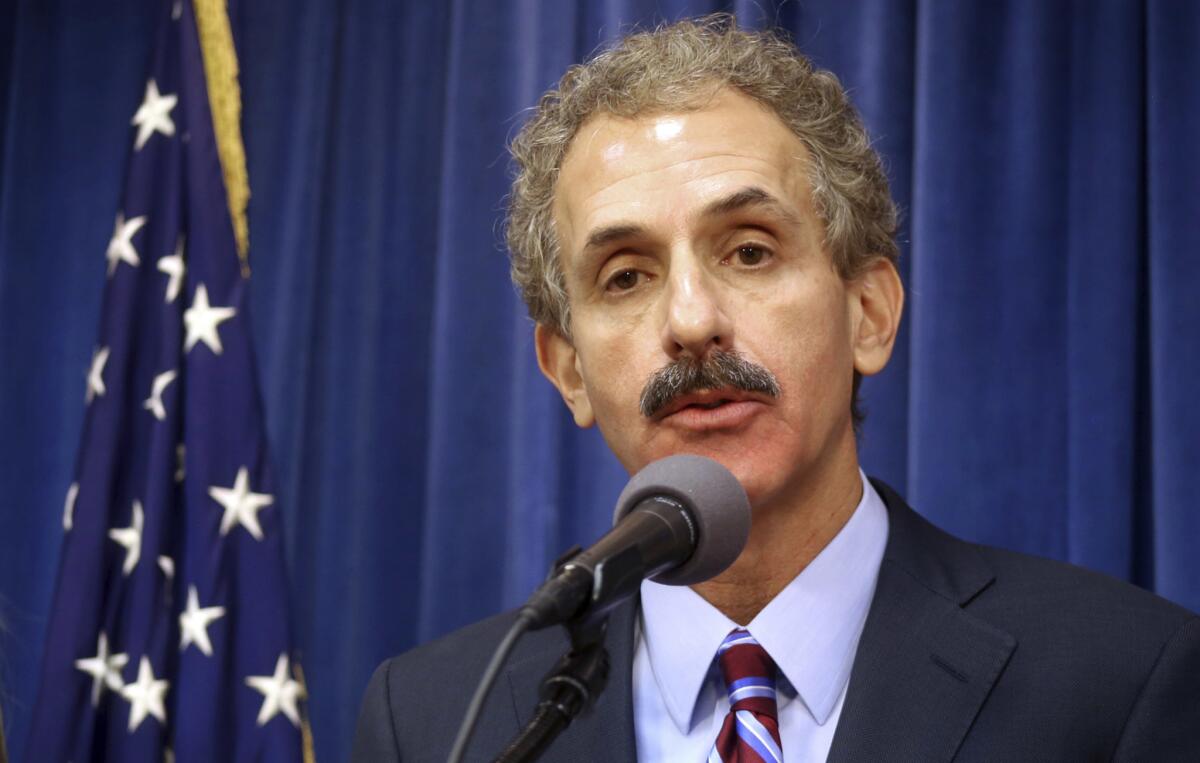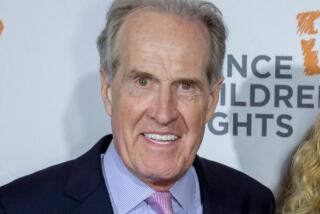L.A. drops lawsuit over DWP billing errors. Now ratepayers could owe millions

The city of Los Angeles moved this week to abandon its high-profile lawsuit against PricewaterhouseCoopers in what amounts to a stunning defeat for City Atty. Mike Feuer, who had tried to blame the consulting firm for the massive overbilling debacle at the Department of Water and Power.
Rob Wilcox, spokesman for the city attorney’s office, said that key witnesses in the city’s case — namely David Wright, former head of the DWP, and Paul Paradis, an attorney who formerly consulted for Feuer’s office — have invoked their 5th Amendment right against self-incrimination, impairing the city’s ability to proceed with its lawsuit.
Wright and Paradis also were named in a recent FBI search warrant in which investigators were seeking information about potential crimes, including bribery and financial kickbacks.
“Unable to overcome the current circumstances, the city is dismissing its case,” Wilcox said.
Feuer’s office had aggressively pursued the case in an effort to recoup potentially hundreds of millions of dollars resulting from the 2013 overbilling fiasco. The city’s legal retreat on Thursday shuts down — at least for now — more scrutiny over its handling of the fallout.
It also means DWP ratepayers will be left with the costs from the billing debacle, on top of possible payouts arising from any litigation over the alleged fraud surrounding the city’s handling of a class-action lawsuit over the billing errors.
A 2018 DWP document estimated that the associated costs to comply with that lawsuit settlement could be as much as $300 million.
The city sued PricewaterhouseCoopers in 2015, alleging that the firm misrepresented its ability to roll out new billing software at the DWP. Hundreds of thousands of customers were overbilled two years earlier, and the city moved to pay $67 million to settle a class-action lawsuit brought by ratepayers.
But the city’s lawsuit against PricewaterhouseCoopers was eclipsed by more recent allegations of fraud and double-dealing by attorneys hired by Feuer to sue the consulting firm. The allegations culminated in July in an FBI raid of the DWP’s headquarters and the city attorney’s office.
When asked about the dismissal, L.A. City Councilwoman Nury Martinez said “the city must do better.”
“We should not lose sight of the fact that it is the ratepayers — especially low-income families and seniors — who were harmed the most by the clear negligence, improprieties and overcharging that took place, as well as the subsequent fallout,” said Martinez, who oversees a committee focused on the utility.
Attorney Tim Blood, who sued the DWP over the billing errors and is critical of the city’s class-action settlement, said the city’s rationale for dismissal of the PricewaterhouseCoopers lawsuit is “absurd” because it doesn’t need Paradis and Wright. The city can rely on internal financial records to seek damages from the consulting firm and “there are many people [at the DWP] who could describe the documents,” he said.
Daniel Thomasch, an attorney for PricewaterhouseCoopers, said in a statement Thursday that the consulting firm intends to pursue monetary sanctions against the city for litigation misconduct, which could allow the firm to recoup legal fees.
The firm’s “defense has revealed that the DWP perpetrated a fraud on the court, on [PricewaterhouseCoopers], and on the DWP’s own customers, in its attempt to cover up its own failures,” Thomasch said.
Also on Thursday, the city filed court documents seeking to freeze more than $11 million in legal fees given to two attorneys who worked on the class-action lawsuit brought in 2015 against the DWP over the billing errors. The filing marks the first time that the city moved to recoup ratepayer money following revelations about the alleged misconduct by attorneys.
The decision opens up a new line of litigation over the settlement and could raise more questions about what city attorneys and DWP officials knew. The settlement was called a “charade” at an August hearing by the judge who oversaw it.
Ian Friedman, an attorney for Jack Landskroner, who represented DWP ratepayers in the class-action lawsuit, said the “truth” would come out in the courtroom and accused the city of deflecting blame.
PricewaterhouseCoopers alleged in court documents that attorneys working for Feuer’s office took part in a scheme to quickly settle the class-action lawsuit brought by DWP ratepayers by hand-picking the plaintiff and the opposing attorneys who filed the claim.
Feuer’s office has denied wrongdoing and cast blame on two outside attorneys it hired. However, one of those attorneys, Beverly Hills lawyer Paul Kiesel, told The Times that his work was done at the “express direction” of Feuer’s office.
Paradis, another attorney who worked on billing litigation, went on to secure a no-bid contract with the DWP worth more than $30 million. Paradis has also denied wrongdoing.
Spokesman Wilcox said the DWP’s Board of Commissioners consented to the dismissal of the case on Tuesday.
DWP General Manager Marty Adams said in a statement that “we are naturally very disappointed by the turn of events that has led to the withdrawal of litigation that was aimed at holding [PricewaterhouseCoopers] accountable for their actions.”
Consumer Watchdog President Jamie Court called the decision to dismiss the case a plan to “silence” the investigation. He also questioned whether it was politically motivated, given that Feuer has publicly said he is considering running for mayor in 2022.
“The city shouldn’t be allowed to dismiss this case before there’s full disclosure. Ratepayer money is being left on the table,” Court said.
Messages left for the attorneys for Wright and Paradis weren’t immediately returned.
More to Read
Sign up for Essential California
The most important California stories and recommendations in your inbox every morning.
You may occasionally receive promotional content from the Los Angeles Times.











